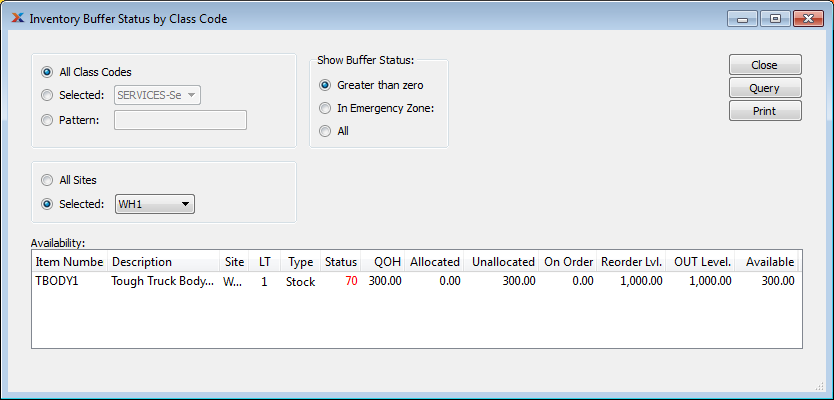
|
xTuple for Service Businesses Demo Guide |
First let's take at look at how the stock buffer operates. Before we begin, we will need to do some initial setup on the item site record for item TBODY1. We will be adjusting its reorder level to 1,000. Then we will make a miscellaneous adjustment to set its quantity on hand to 300. Finally, we will run constraint management to discover the system-defined value for the item site's stock buffer status. To access the Item Site screen, follow these steps:
Pull down the module menu.
Select the submenu.
Choose the option.
Double-click on item TBODY1.
Navigate to the tab.
Change the value in the Reorder Level field to "1,000".
Click the button.
On the Item Sites master list screen, click the button.
By setting a reorder level of 1,000 for item TBODY1, we are saying that when available quantity for this item site drops below 1,000 units, it is time to resupply. We are also saying that the stock buffer for this item site is 1,000 units.
Next we will make a miscellaneous adjustment to the quantity-on-hand (QOH) for item TBODY1. Making this adjustment will allow us to see how the constraint management system handles discrepancies between reorder levels and available quantities. To adjust QOH for this item site, follow these steps:
Pull down the module menu.
Select the submenu.
Choose the option.
Enter the following values: Item Number = "TBODY1"; Site = "WH1"; Adjustment Qty. = "300"; Absolute = checked; Document # = "Constraint Management".
Click the button.
QOH for item TBODY1 in the WH1 site is now set to 300 units.
Click the button.
A stock buffer, as the name implies, is an accumulation of items stored in inventory that act as a hedge against demand where the required service time is shorter than a time buffer for that item would allow. For example: If we have a standard part that takes two weeks to produce, but which we must be able to ship in one day, we would stock that item to ensure the one-day service level. In another case, we may be able to produce the item in a day, but sometimes seasonal load changes result in a production bottleneck where the backlog on a critical resource for that item is greater than a day. The stock buffer allows us to continue shipping the item under those circumstances. It is important to note that due dates are irrelevant for orders with stock buffers. The buffer size is determined by the reorder level at the item site.
Okay, we are finished with the setup needed for our scenario. We are now ready to run the constraint management system—and to learn the buffer status of our newly-adjusted item site. To run the constraint management system by planner code, follow these steps:
Pull down the module menu.
Select the submenu.
Select the submenu.
Choose the option.
Check All Planner Codes and All Sites.
Click the button.
The constraint management results displayed for this scenario assume you have completed all the work orders created in the previous sections of this demo guide. If you have not already completed those work orders, then your results will differ from those shown here.
Now that we have run the constraint management system, we can display the results. To display the results of our buffer status run, follow these steps:
Pull down the module menu.
Select the submenu.
Select the submenu.
Choose the by Class Code option.
Click the button.
The following screen will appear:

The color red is a signal that an item has consumed at least 66% of its buffer. Items in this category are considered to be red hot. This means they require immediate attention. The best remedy for red hot item sites is to expedite any associated work orders or purchase orders.
As you can see in the example, the buffer status calculation is shown in the Status column. If an item has a buffer status of 66 or greater, it will display in red. The buffer status for item TBODY1 = "70". To review how this number was arrived at, we use the following equation:
1,000 units (Reorder/Buffer Level) - 300 units (QOH) - 0 Units (Allocated) = 700 units
This equation shows us that the stock buffer for this item site has been depleted by 700 units—or 70%. Keep in mind that this calculation also subtracts out allocated quantities, which in this case are zero. Hence, the buffer status for item TBODY1 in site WH1 = "70".
Click the button to exit the display.